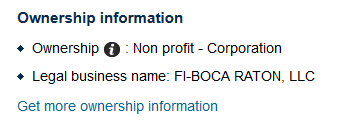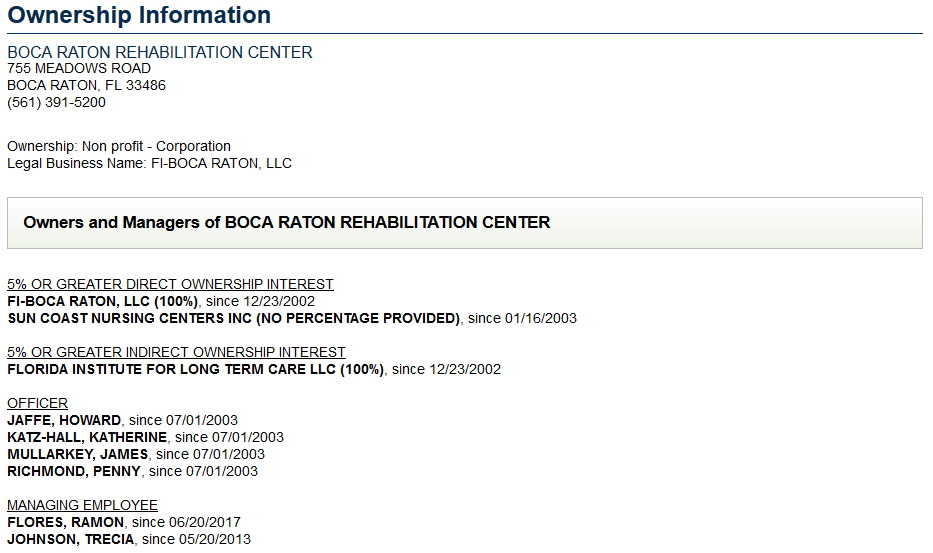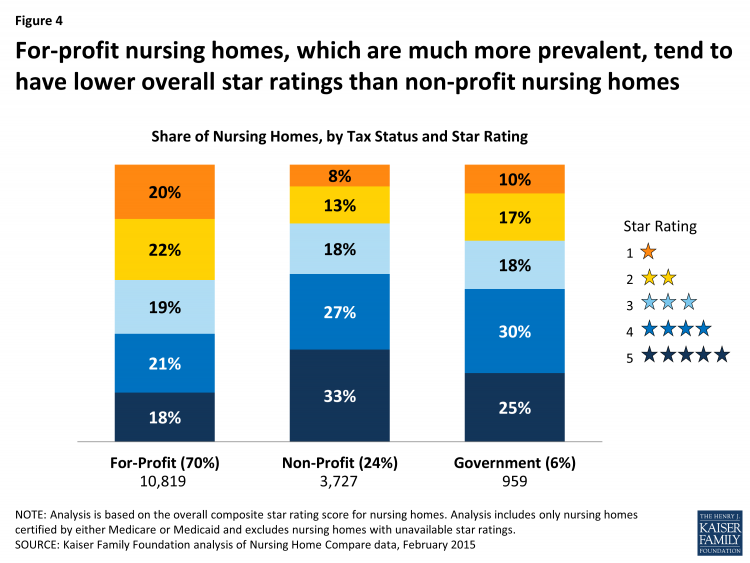Non-profit nursing homes generally perform better than for-profit facilities. However, the real question should be, is my facility truly a non-profit nursing home? Or is the ‘not for profit nursing home’ a for-profit facility in disguise? You should always do a deep dive on who owns the nursing home before entrusting your loved one to the facility’s care.
Unfortunately, not all non-profit nursing homes are what they claim. Some nonprofit facilities are still very focused on making money; but they cleverly hide this from consumers like you.
Generally Speaking, Non Profit Facilities are Better than For Profit Nursing Homes
Ownership matters. Culture emanates from the top. Almost every study on the subject confirms that not for profit nursing homes have less deficiencies, less bedsores, fewer falls, and less nursing home abuse lawsuits when compared to their for-profit equivalents.
The acquisition of nursing homes by private investment firms has raised questions about the potential effects on the quality of care. . . PI [private investment] acquired homes had more total deficiencies and lower total nurse staffing ratios than nonprofit homes, both before and after acquisition. – U.S. Government Accountability Office, 2011 Study.
Traditionally, non profit nursing homes cost more when compared to their for profit counterparts. However, this issue is moot to most Americans who have Medicare or Medicaid picking up the tab on a nursing home residency.
So when choosing between a true not-for-profit or a corporation, you are usually better off with the non-profit. However it can be tricky to determine a real non-profit facility.
Not-for-Profit vs. Concealing-the-Profits
“My Mom’s nursing home is not for profit. All the proceeds get recycled back into the care the residents receive,” … You like the sound of that, right?
Savvy corporate nursing home owners are aware of this and may try to capitalize on the public’s distrust of for-profit facilities.
It is for this reason that you need to investigate whether your nursing home is actually non-profit, or just a clever sales pitch.
How a Non-Profit Nursing Home Siphons Off Profits While Still Maintaining a Not for Profit Title
Since the 1990’s, there has been a trend of nursing home operators, also referred to as licensees, to hire outside agencies to do peripheral care, management or maintenance for facility residents. If the owner of the nursing home also has ownership interests in those other peripheral companies, these are called ‘related entities’.
If an individual owns the licensee/facility, as well as other outside companies, and the facility pays the captive outside companies to do work, it is essentially the left hand paying the right hand.
This is a clever way that nursing home operators can maintain a not-for-profit nursing home title while still making millions of dollars per year.
An Example of How a Non-Profit Nursing Home Diverts Money to For Profit Companies
 For example, let’s assume Bob Smith owns Happy Acres Nursing Home. The facility is a non-profit. Bob Smith likes parading around his non-profit nursing home banner, as it results in higher occupancy rates on his nursing home census.
For example, let’s assume Bob Smith owns Happy Acres Nursing Home. The facility is a non-profit. Bob Smith likes parading around his non-profit nursing home banner, as it results in higher occupancy rates on his nursing home census.
Here’s what his residents and their families do not know. Happy Acres outsources its management to Healthcare Consulting LLC. Happy Acres does not own the building, instead paying rent to Healthcare Land Acquisitions LLC. Happy Acres pays Healthcare Supplies LLC for its diapers, healthcare equipment, medical supplies, linens, etc. Happy Acres exclusively gets its prescription medicine filled by Happy Pharmacy, which is exclusively owned by Bob Smith. The list of related entities goes on to include 30 more companies.
Bob Smith is the majority owner of all of these related entities. In other words, Bob Smith gets to hold out to the public that Happy Acres is a not for profit nursing home, while diverting millions of dollars to his related companies, which are all very much for profit.
Approximately 75% of American nursing homes siphon money from the facility using a complicated corporate web of related entities. This includes non-profit nursing homes as well.
Getting to the Truth on Non-Profit Nursing Homes
A recent Boston Globe article analyzed the nursing home industry and came to this conclusion; they are good at hiding money. “These homes are making money on every single angle, they are hiding their profits, padding all their administrative costs, upping executive salaries,” says Charlene Harrington, a professor at the University of California.
An Arkansas appellate court also analyzed in detail the concept of a “not for profit” nursing home. In exposing its non-charitable purpose, Arkansas’ Court of Appeals analyzed eight factors:
(1) whether the organization’s charter limits it to charitable or eleemosynary purposes;
- In most nonprofit nursing homes, a charter does not even exist. Where one does, it generally does not hold itself out as a charity.
(2) whether the organization’s charter contains a “not-for-profit” limitation;
- As discussed above, most nonprofit facilities do not have this limitation. Even if they do, the limitation alone does not serve as conclusive proof that a nursing home is truly a non-profit.
(3) whether the organization’s goal is to break even;
- In most nonprofit nursing homes, the license holder (the licensee entity running the facility) breaks even, but there is a vast web of related companies owned by the owners of the licensee. These related companies are for profit and siphon off the profit margin that otherwise would have shown for the licensee entity. So even if the licensee makes no profit, all the related companies are making money hand over fist.
(4) whether the organization earned a profit;
- See the above explanation. A facility may not make money, but if the facility owner also owns the linen company, food services company, accounting service, medical supply company, pharmacy, and housekeeping company, all of which are paid 5x market rates, those companies will be wildly profitable. Using this bogus nonprofit nursing home structure, the facility is not making money, but the owners of the facility are making plenty of money through all the related companies that contract with the facility.
(5) whether any profit or surplus must be used for charitable or eleemosynary purposes;
- Rarely do surplus moneys go to a charitable purpose. Instead, they are usually siphoned off to related entities with common ownership.
(6) whether the organization depends on contributions and donations for its existence;
- In most nonprofit nursing homes, the facility does not receive charitable donations as its lifeblood. It makes money just like every other for-profit nursing home; it charges residents for services provided.
(7) whether the organization provides its services free of charge to those unable to pay; and
- Did anyone in the facility not have to pay to reside there? If not, the nursing home is probably not a charity-based nursing home.
(8) whether the directors and officers receive compensation.
- Nonprofit nursing homes are commonly structured with a Board of Directors. Not only do these Board members receive compensation, but they usually own the ancillary service companies too. As ludicrous as it may sound, we oftentimes see a “contract” between a “non-profit” nursing home and a for-profit management company, where the contract is signed by John Smith for the nursing home, and signed again by John Smith on behalf of the management company. It is literally using the left hand to pay the right hand.
In the case of Progressive Eldercare v. Cauffiel, the Plaintiff argued that the Defendant Non-Profit nursing home “cleverly concealed [profits] by paying various related entities for rent, management, janitorial services, staffing services, and information technology services. . . and that four of the five independent contractors on [the nursing home]’s payroll—which receive a combined total of over $4.5 million annually—are related entities.”
Judge David Glover stated succinctly:
“There are no present-day nursing homes operating exclusively for a charitable purpose. Further, it is a legal fiction that any nursing home today is entitled to charitable immunity simply because its legal form is structured to enable profits to be siphoned off to subsidiary for-profit companies—owned by the same people who own the “charitable” nursing home. Government payments for services are still payments for services, and writing off “what Medicare or Medicaid does not pay” does not equate to providing free services.” Id.
Taking Non-Profit Nursing Homes to Task
Do your homework on the alleged not for profit facility. We recommend you use ProPublica to investigate deeper your specific facility. Once you find your specific nursing home licensee, use the Non-Profit Explorer to delve deeper into the facility financials. You can also visit CMS’s Nursing Home Compare site, look up your specific facility and then click on the ownership section.
Try to determine if the Board that controls the non-profit nursing home also owns related vendors. If so, it is likely that much of the would-be profit from the facility is showing up as profits for the vendors.
Red Flags of Deceit – Decoding a Nursing Home Not for Profit Lie
If you notice your “non-profit” nursing home is siphoning off all of its revenues to companies that are owned by the same individuals, this is suspect.
Example: A non-profit nursing home operates at a break even threshold, but pays more than $4 million to a pharmacy, a linens company, and a management company, all coincidentally owned by the same 3 people.
If you notice your not-for-profit nursing home is paying hefty executive bonuses and salaries, it is possible that the facility’s non-profit status may be more marketing and less reality.
Example: A nonprofit facility pays its executive board of 2 people more than $4 million in bonus compensation.
Do Your Research!
At the end of the day, you have to feel comfortable with the facility you choose. If it is for-profit, make it a good one. If you choose a nonprofit, do some digging and make sure the non-profit status is legitimate.
Digging Deeper: An Example of Pinning Down True Nursing Home Ownership
As nursing home abuse lawyers, we have pursued claims against Boca Raton Rehabilitation Center. This facility is listed as a non-profit nursing home. Let’s dig deeper into the facility ownership.
Step 1: Go to Medicare.gov’s Nursing Home Compare Search. Search for Boca Raton Rehabilitation Center.
This is where you will find whether your facility is a not for profit.

Step 2: Click ‘Get More Ownership Information’ to See Who Really Owns the Facility

States with Many Non-Profit Nursing Homes
The following states have a greater proportion of non-profit nursing homes:
- Minnesota
- Wisconsin
- Michigan
- North Dakota
- South Dakota
- Illinois
- Ohio
Traditionally, non-profit nursing homes have lower citations and overall better health outcomes for residents. However, our nursing home abuse attorneys are witnessing more for-profit chains market themselves as non-profits in order to boost their census numbers.
States with Higher Rates of For Profit Nursing Homes
The following states have a higher than average number of for profit nursing homes:
- California
- Florida
- Texas
- Oklahoma
- New York
For profit nursing homes have historically performed worse than true not-for-profit facilities. For profits nursing homes are increasingly owned by private equity firms, REITs, or investor/owners. Regardless of the corporate structure the owners use, a for profit nursing home’s top priority is making money; not resident care.
Suspect Neglect Inside a Non Profit Nursing Home?
If you believe your loved one was wrongfully injured or suffered wrongful death inside a not-for-profit nursing home, let our law firm help. At Senior Justice Law Firm, our firm’s mission is to zealously advocate on behalf of victims of elder abuse and neglect. We retain forensic accountants and tax law professionals to perform a deep dive on the non-profit’s financials, all in an effort to elucidate the truth.
When a nursing home claims to be a not for profit, we always view that claim with skepticism. Unfortunately, almost all decisions made in America’s nursing homes today are driven by a desire to make money. For this reason, it is crucial that your attorneys determine if the facility is truly a non-profit, or merely a for profit masquerading as a charity.
Our nursing home abuse attorneys have successfully uncovered dozens of nursing home chains’ financial documentation evidencing corporate misconduct.
We are unique in that this is our law firm’s focus. Call us today to see why we are different and how we can help you after a family tragedy: 888-375-9998
Updated on 05/16/2022


